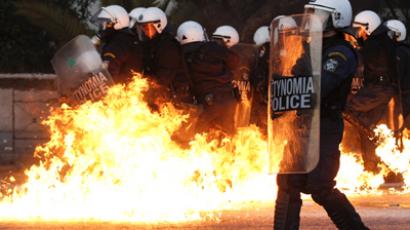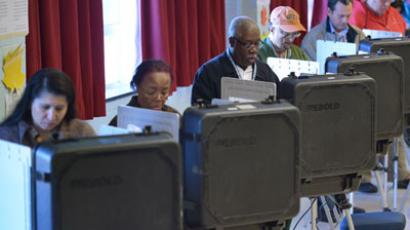Uneasy legacy of 2012: EU crisis, Syrian conflict, Assange revelations and more
As the New Year’s fireworks die down and 2013 begins in earnest, RT looks at 2012’s most memorable moments: The Olympics, the Israel-Gaza conflict, Ecuador granting Assange asylum, protesters clashing with riot police in Madrid and Athens, and more!
Two major topics made constant headlines throughout the year,
the war in Syria and the crisis in the European Union
Syria’s bloody domestic conflict did not scale down, with the
opposition and western countries pushing for Syria’s President
Bashar Assad to step down. However, demands and predictions that he
would fall in 2012 went unfulfilled. In early November Assad sat
down for an exclusive interview with RT insisting he would not give
up as the forceful, uncompromising push for regime change continued
and terror reigned in his country.
“I am not a puppet. I was not made by the West to go to the West
or to any other country. I am Syrian, I was made in Syria, I have
to live in Syria and die in Syria,” he told RT.
Deemed everything from civil war to sectarian fighting to
terrorism to genocide – Syria stayed centre stage of a media war
throughout 2012, with unconfirmed atrocities on both sides haunting
the web and only one side taking the brunt of the blame.
The EU, meanwhile, was going through a battle of finances which
left behind a trail of other casualties – ordinary people out of
jobs and hope. With the financial crisis deteriorating,
nation-wide strikes were staged and thousands went to the streets
as people grew tired of growing cuts and economic
hardships.
Spain had millions rallying at a time demanding the government
stop cuts and Greece saw massive demonstrations, as a 44 billion
Euro bailout received at high cost,does not improve their
woes.
The year however, was full of all sorts of events: wars and science break-throughs, human rights triumphs and losses. Below, RT lists a calendar of the most memorable events.
January
Costa Concordia with 4,252 people on board runs aground off the Italian coast after hitting a reef. The tragedy takes the lives of some 30 people and adds a new, very sad landmark, to the coastline of Isola del Giglio – a half sunk cruise ship.
The EU announces an oil embargo for Iran, effective July 2012. Tehran’s disputed nuclear program also draws trade and bank restrictions imposed on the Persian country. The EU’s move almost instantly follows similar measures taken by Washington.
Throughout the year Iran will declare their economy is not suffering any losses, while tensions in the Strait of Hormuz will be spiking as American aircraft carriers pay frequent visits. The year will also be punctured by Iran’s and Israel’s mutual threats with Benjamin Netanyahu finally taking out a red marker at the UN General Assembly and drawing a line for Tehran’s nuclear enrichment.
February
After 30 years of drilling, Russian scientists reach “The Lost
World” – Antarctic
Lake Vostok, a unique subglacial reservoir formed 20
million years ago.
March
Russia re-elects Vladimir Putin president for a third term.
At least 16 civilians are killed in Kandahar, Afghanistan, by a US soldier Robert Bales. At the moment, Bales is in the US awaiting a court martial. Army officials will seek capital punishment. The incident follows an accidental burning of Koran copies at a US military base that provoked violent massive protests in February.
April
A 77-year-old Greek man shoots himself in front of the parliament in Athens saying in his death note that he refuses to “search for food in garbage”. The death reignites austerity anger in crisis-stricken Greece.
May
In Russia, protests turn violent for the first time since the recent opposition movement began rallying in December 2011, in an attempt to get the parliamentary and presidential elections restaged. Over 400 arrests are made and both protesters and police report injuries. Since May 6 events, 13 criminal cases over igniting unrest have been opened and the laws regulating demonstrations have been toughened. The new opposition has also started visibly losing colour.
June
A Cairo court sentences Egypt’s former president Hosni
Mubarak to life in jail over murder and attempted murder of 225
anti-government demonstrators in January 2011.
Myanmar dissident Aung San Suu Kyi finally delivers her Nobel acceptance speech at Oslo's City Hall – two decades after being awarded the peace prize.
July
The European Parliament votes against the Anti-Counterfeiting
Trade Agreement after weeks of massive protests across Europe.
ACTA
critics said the law would protect copyright at the expense of
freedom of speech on the Internet.
Abundant rains in Russia’s south provoke a flood which kills 171 people while over 35,000 others suffered from the torrents. The disaster sent thousands of volunteers from all over the country to Krasnodar Region to help deal with the aftermath.
James Eagan Holmes sets off tear gas grenades and then
fires at the audience in a movie theatre in Aurora, Colorado,
at the first night of the film “Dark Knight Rises”. Twelve people
are killed and 58 others are injured.
Queen Elizabeth II declares the Summer Olympic Games open.
August
The US Senate kills the Cyber Intelligence Sharing and Protection Act (CISPA). The act was designed to allow the government gather internet traffic information from private companies and thus ensure cyber-security. Back in January, the US Congress sent back SOPA and PIPA bills designed to curb online piracy in the wake of massive protests which included a Wikipedia black-out.
A Moscow court sentences three members of the feminist punk group Pussy Riot to two years in a medium-security prison for hooliganism motivated by religious hatred and enmity. The scandal that followed the band’s controversial performance in Moscow’s central cathedral made world headlines and split the world into two camps: the first one hailing Pussy Riot’s audacious political protest, the other one condemning the grave insult to Orthodox Christians’ feelings.
Ecuador
grants political asylum to the WikiLeaks founder Julian
Assange. As an advocate for free speech, Assange spent more
than half of 2012 under house arrest in the UK but still
managed to find a way to communicate. Despite Ecuador’s decision,
Assange was forced to remain at the country’s embassy in London as
Britain denied him safe passage.
Neither house arrest nor his exile at the embassy prevented
Assange from making his exclusive
talk show with RT. The Julian Assange Show was launched on RT
in April; his guests included those shunned by the mainstream media
like Hezbollah leader Sayyid Nasrallah, Bahraini activist Nabeel
Rajab, US Noam Chomsky, Occupy Wall Street Movement activists and
many others.
In Norway, far-right extremist Anders Breivik is sentenced to 21 years imprisonment. The court has found him guilty of carrying out a bombing and shooting massacre in and around Oslo, which killed 77 and wounded over 240 in July 2011. Breivik refuses to appeal the verdict and apologises for not killing more.
September
Thousands of Egyptian protesters storm a US embassy in Cairo
removing the American flag and trying to replace it with a black
flag reading "There is no God but Allah." The crowd was infuriated
by a YouTube trailer to ‘The Innocence of Muslims’, a
Californian-made amateurish movie which mocked the Prophet
Mohammed. The Cairo outrage ignited worldwide
Muslim protests which resulted in over 70 deaths.
The assault on the US embassy in Egypt coincided with a terrorist attack on the American consulate service in Libya’s Benghazi that claimed the life of the US ambassador to Libya,along with three other Americans.
October
And the Nobel Peace Prize goes to… the European Union!
The Superstorm Sandy devastates the Caribbean and the US East Coast. In Haiti, Jamaica, Cuba and the Bahamas the hurricane took at least 122 lives, while in the US there were 131 fatalities. Major destruction and devastation followed Sandy’s progress.
November
Barak Obama secures another term as the US President. However, as America went through its most expensive election ever, not all candidates received a fair opportunity to take a full part in the presidential race.
Despite being on the ballot in enough states to technically win,
US Presidential Candidate Jill Stein and other Third Party
candidates were not allowed to debate and received almost no
coverage in the lead up to elections on US networks. As a result,
they had to look for alternative ways to bring their platform to
the voters – and RT
Washington’s studio aired one of the debates.
Israel launches a Pillar of Defence military operation in Gaza with an air strike, killing Hamas military commander Ahmed Jabar. Eight days of military action saw about 170 Palestinians and 6 Israelis killed.
Shortly after an Egypt-brokered ceasefire, Palestine celebrates gaining UN non-member status with an overwhelming majority supporting the decision.
December
Adam Lanza opens fire in an elementary school in Newtown,
Connecticut, killing
twenty children and six adults.
The majority of Egyptians uphold the country’s new constitution, exit polls show. This comes despite recent fierce demonstrations between the constitution supporters and opponents across the country that saw several people killed, dozens injured and resulted in President Mohamed Morsi being driven out of his residence in Cairo. Critics of the new document slam it for proclaiming the Islamic law as the main guiding principle for Egypt. Constitution opponents were also infuriated by Morsi’s November decree, which granted him nearly absolute powers.














